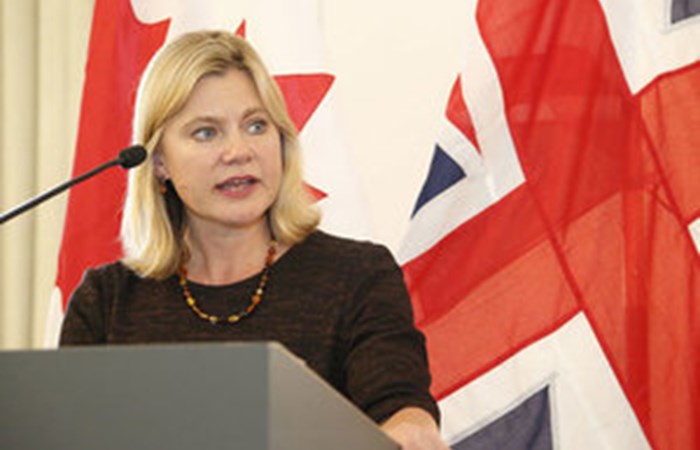Department for International Development

Ahead of a landmark conference on the Syria crisis in London next week, International Development Secretary Justine Greening is calling on world leaders to seize the chance to change the lives of a generation of children caught up in the conflict.
Around half of the 1.4 million Syrian refugee children in the region are not in school. Within Syria the challenge is even greater with 2.1 million children out of school.
Missing out on education prevents children from gaining the skills to compete in the jobs market of tomorrow, increases the risk of families resorting to negative coping strategies such as early marriage and child labour and leaves young people potentially vulnerable to radicalisation and extremism.
The ambition for the Syria conference is simple: There will be no lost generation of children as a result of the crisis. No one would disagree with this aim, but increased funding is urgently needed to make it a reality.
Justine Greening said:
The Syria conference will be an historic moment for world leaders to make a real and lasting difference to the lives of millions of children affected by the Syria crisis.
No child should miss out on an education because of conflict. These are the children who can one day rebuild Syria if the world is willing to invest in them now.
The UK has already got a quarter of a million children back into the classroom and learning. If other countries can join our efforts, we can meet our goal at this conference of getting all Syrian refugee children into education by the end of this coming academic year.
Humanitarian aid from the UK and other donors has been the difference between life and death for many, but there is a need for more innovative ways to fund education longer term as well as working with the private sector. This could include:
- expanding and upgrading public schools, alongside transport and other vital infrastructure
- funding to train and pay more teachers as well as providing textbooks and other essential teaching tools
- extending non-formal or alternative education for those unable to access a formal school
- expanding access to Early Childhood Education so that children learn well and integrate socially from an early age and are prepared for formal schools
- ensuring every child reaches their potential regardless of gender, nationality or ability
- requiring schools to offer a safe, inclusive and tolerant environment for children and their communities
Many children are also suffering from the long term negative physical and psychological impacts of the crisis. Quite simply, there will be no future for Syria if the international community neglects Syrias children and doesnt halt this damaging legacy.
By the end of June 2015, UK support inside Syria and in the surrounding region had supported education for over a quarter of million children. In Lebanon for example an innovative double-shift system has meant even more children can go to school despite a lack of facilities. Britain is working with both the Jordanian and Lebanese governments to fund school places in formal schools and non-formal education, provide books and learning materials and as well as ensuring children who have experienced severe trauma get the care they need.
Notes
- The UK has pledged over 1.1 billion, our largest ever response to a single humanitarian crisis. We are the second largest bilateral donor after the US.
- On 4 February the UK is co-hosting with Germany, Norway Kuwait and the UN a major conference in London to raise funds for Syria and the region. More information here www.supportingsyria2016.com/about/
- In Jordan the UK is working with the Government and the US on a major national programme to improve the quality of public school education for both Jordanians and Syrians. DFIDs 15 million of support along with US funding will help improve education for over 400,000 children in 3,000 schools. In addition, DFID is supporting UNICEF Jordans innovative Makani programme (MySpace in Arabic) to reach vulnerable out of school and working children with non-formal education and counselling.
- DFIDs education programme in Jordan is training teachers in participating schools in counselling for Syrian refugee children who have been through severe trauma. They will also be trained to pick up the warning signs that mean the child needs to be referred to the authorities.
- The UK has made an 80 million commitment to Lebanon over a 5 year period, and is working in close partnership with the Lebanese Ministry of Education, UNICEF and the World Bank, on both policy and programmes, with impressive results: there are now more than 200,000 Syrian children in formal schools this year.
- We also work in partnership with the World Bank on strengthening the public school system, and with UNICEF on providing non-formal education to the most vulnerable out of school children plus vocational and skills training for youth.
